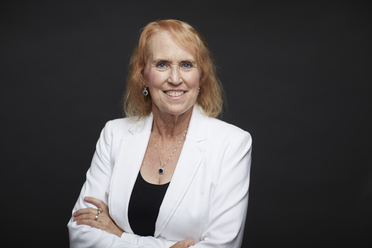
Donna M Hallas
PhD CPNP PPCNP-BC FAAN FAANP PMHS
Clinical Professor
Program Director, Pediatrics NP
dh88@nyu.edu
1 212 998 5295
433 First Ave
New York, NY 10010
United States
Donna M Hallas's additional information
-
-
Donna Hallas, PhD, PPCNP-BC, CPNP, PMHS, FAANP, FAAN, is Director of the Pediatrics NP Program and a Clinical Professor at NYU Rory Meyers College of Nursing. She is a certified pediatric nurse practitioner (CPNP: PPCNP-BC) and a pediatric mental health specialist (PMHS). Prof. Hallas is fellow of the American Academy of Nursing (FAAN); and a fellow of the American Association of Nurse Practitioners (FAANP). She maintains a practice as a PNP in primary care specializing in the care of high-risk children and for young children with behavioral problems. At NYU Meyers, she prepares pediatric nurse practitioner students to provide quality health care services for infants, children, adolescents and young adults within a family-centered framework.
Hallas’ conducted research with prenatal women and mothers of infants for vaccine hesitant and refusing individuals. The overall goal of her research is to improve healthcare outcomes for pediatric patients. Currently, her research is with a Professor of Computer Science in the NYU Courant Institute of Mathematical Sciences, studying the effectiveness of an app to help young children manage their behaviors. She is also beginning to investigate ways that toddlers and preschoolers develop technology skills.
Since the COVID-19 pandemic, she has been a frequent speaker locally and nationally on the topic of vaccine hesitancy providing guidance on ways to improve vaccine uptake. In addition, she has been frequently asked to provide guidance on how to prevent COVID-19 infections for children in all settings.
She has presented at national and international conferences on the implementation of evidence-based practice in ambulatory pediatric healthcare centers. She has presented the results of a randomized controlled trial to improve the social-emotional development of toddlers and improve maternal confidence in caring for toddlers at research conferences. She presented the outcomes for a qualitative study on the social and emotional development of adolescents whose mothers passed away during their pre-teen and teenage years. She implemented a funded study on oral health care for newborns and young children. She works collaboratively with dental faculty to improve the oral health care of children from diverse populations. She conducted a randomized controlled study to reduce the incidence of vaccine hesitancy in prenatal women and mothers of newborns. She also received a 2.1-million-dollar HRSA grant to develop an innovative academic clinical partnership and educational program for preceptors who clinically educate primary care nurse practitioners.
She is published in peer-reviewed journals on the oral healthcare needs of young children and has designed a new approach for oral health assessment in office-based practices regarding young children. She was a content expert for the American Academy of Pediatrics for the design of a web-based program for pediatricians, nurse practitioners, and all primary care providers on oral health assessments, management, and referrals for children and adolescents to improve the oral healthcare and status of this population. Hallas also served as an expert panel member for the systematic evaluation of oral health programs through a grant from Robert Woods Johnson. Hallas writes a monthly column for nurse practitioners which is published in Contemporary Pediatrics. In 2018, Hallas’ first textbook, Pediatric Behavioral Health for Nurse Practitioners: A Growth and Developmental Approach to Intercepting Abnormal Behaviors, received the prestigious American Journal of Nursing Book of the Year Award: First Place for Psychiatric Mental Health and Third Place for Child Health.
Hallas is the Editor-in-Chief for the Journal of Pediatric Health Care, a research and clinical practice journal for pediatric nurse practitioners and for all practitioners and health care providers who care for the pediatric populations.
Among her many honors, in 2022, she received the NYU Distinguished Teaching Award and the NYU Meyers Distinguished Teaching Award; In the 2018, she received the Nassau County Woman of the Year Award from NYS Assemblyman Representative, John Mikulin; In 2016 she received the AANP Award for Excellence in Clinical Practice (New York State) and the Nurse Practitioner of the Year award from the Nurse Practitioner Association of Long Island.
-
-
PhD, Adelphi UniversityMS, State University of New YorkMS, Indiana UniversityBS, Adelphi UniversityBS, University of HartfordDiploma, St. Mary’s Hospital School of Nursing
-
-
Primary carePediatricMental health
-
-
American Academy of Nursing (Fellow)American Association of Nurse PractitionersAmerican Association of Nurse Practitioners FellowsAssociation of Faculties of Pediatric Nurse Practitioners ProgramsEastern Nursing Research SocietyGreater New York Chapter of NAPNAPInternational Institute of Qualitative Methodology, Alberta, CanadaNational Association of Pediatric Nurse PractitionersNational Organization of Nurse Practitioner FacultySigma Theta Tau, Kappa Gamma Chapter and Upsilon Chapter
-
-
Faculty Honors Awards
Distinguished Teaching Award, NYU Meyers College of Nursing (2022)Distinguished Teaching Award, NYU (2022)Fellow, American Academy of Nursing (2019)Woman of the Year, Nassau County 17th District (2018)Book of the Year Award, American Journal of Nursing (2018)Award for Excellence, American Association of Nurse Practitioners New York State (2016)Named One of the Top 25 Pediatric Nurse Practitioner Faculty, U.S. (2014)Distinguished Educator Award, NYU College of Dentistry (2012)Fellow, American Academy of Nurse Practitioners (2011)Nelms-Miller Editorial Award, National Association of Pediatric Nurse Practitioners (2011)Nurse Practitioner of the Year, Nurse Practitioner Association of Long Island (2010)Award for Excellence in Education Sigma Theta Tau, Kappa Gamma Chapter (2009)President's Outstanding Contribution Team Award, Pace University NCLEX Success Team (2006)Presidents Award for Excellence for the Manuscript, National Association of Pediatric Nurse Practitioner (2003)Award for Excellence in Nursing Leadership, Sigma Theta Tau, Kappa Gamma Chapter (1993)Fellow, National Association of Pediatric Nurse Practitioners (1991)Fellow, Nassau Association of Nurse Practitioners (1991)Winning Essay, Health and Public Affairs Scholarship (1990)Induction Sigma Theta Tau, Kappa Gamma Chapter, International Honor Society for Nurses (1990)Honors Graduate, Adelphi University (1990) -
-
Publications
No publications could be found that match your search criteria. -
-
Media